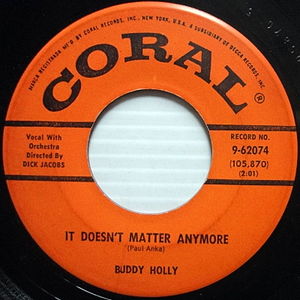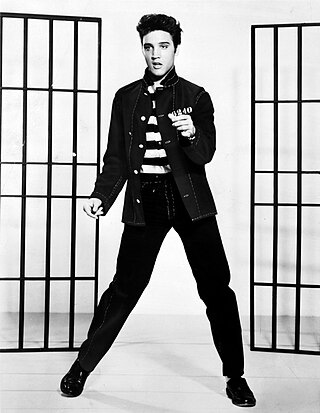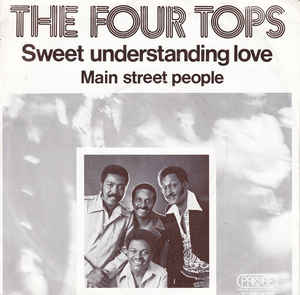
The Three Degrees is an American female vocal group formed circa 1963 in Philadelphia, Pennsylvania. Although 16 women have been members over the years, the group has always been a trio. The current line-up consists of Valerie Holiday, Helen Scott, and Freddie Pool. Tabitha King is currently filling in for Helen Scott, who is currently suffering from coronavirus. The group were particularly successful in the UK, achieving 13 Top 50 hit singles between 1974 and 1985.

"When a Man Loves a Woman" is a song written by Calvin Lewis and Andrew Wright and first recorded by Percy Sledge in 1966 at Norala Sound Studio in Sheffield, Alabama. It made number one on both the Billboard Hot 100 and R&B singles charts. Country singer John Wesley Ryles had a minor hit with his version of the song in 1976 while singer and actress Bette Midler recorded the song 14 years later and had a Top 40 hit with her version in 1990. In 1991, Michael Bolton recorded the song and his version peaked at number one on both the Billboard Hot 100 chart and the Billboard Adult Contemporary Singles chart.
"Fire" is a song written by Bruce Springsteen in 1977 which had its highest profile as a 1978 single release by the Pointer Sisters. The song was also released by Robert Gordon and Springsteen himself.

"Déjà Vu" is a hit 1979 ballad written by Isaac Hayes with lyricist Adrienne Anderson, recorded by Dionne Warwick for her album Dionne which Barry Manilow produced. The song won Warwick a Grammy Award for Best Female R&B Vocal Performance at the 22nd Grammy Awards.

New Dimensions is a studio album by the American vocal trio The Three Degrees. Released in 1978, the album was produced by Giorgio Moroder and yielded three UK Top 20 hit singles, "Giving Up, Giving In", "Woman in Love", and "The Runner". The album peaked at No. 34 in the UK Album Chart in early 1979.

"We're All Alone" is a song written by Boz Scaggs, which became a hit for Frankie Valli in 1976. The next year it was a top-ten hit for Rita Coolidge in the US and the UK. Scaggs introduced it on his 1976 album Silk Degrees, and included it as the B-side of two of the four single releases from that LP, including "Lido Shuffle".

Take My Time is the debut album by UK pop singer Sheena Easton. Released in January 1981, the album reached number 17 in the UK and earned her a Gold Disc. Two months later, a ten track version of the album was released in the US and Canada as Sheena Easton. The album went gold in the US and platinum in Canada.
"It's Too Late to Love Me Now" is a song written by Gene Dobbins, Rory Bourke, and Johnny Wilson. Since its composition, the song has been covered as a single by various artists from the country and pop musical genres. It was first released as a single by country artist, Charly McClain in 1977.

"What You Won't Do for Love" is a song by American singer-songwriter Bobby Caldwell. It was released in September 1978 as the lead single from his eponymous debut album. It was written by Caldwell and Alfons Kettner, and produced by Ann Holloway. The song has been covered and sampled numerous times, including by Tupac Shakur in the posthumous 1998 hit "Do for Love".

"With You I'm Born Again" is a 1979 duet written by Carol Connors and David Shire that originated on the soundtrack of the 1979 motion picture Fast Break. It was performed by Motown recording artists Billy Preston and Syreeta Wright and became an international hit for the duo, reaching number four on the Billboard Hot 100 and number two on the UK singles chart.

"It Doesn't Matter Anymore" is a pop ballad written by Paul Anka and recorded by Buddy Holly in 1958. The song was issued in January 1959, less than a month before Holly's death. "It Doesn't Matter Anymore" reached number 13 as a posthumous hit on the Billboard Hot 100 chart in early 1959, shortly after Holly was killed in a plane crash on February 3, 1959. The single was a two-sided hit, backed with "Raining in My Heart". "It Doesn't Matter Anymore" was Holly's last US Top 20 hit and featured the orchestral backing of Dick Jacobs. It was also successful in the United Kingdom, where it became the country's first posthumous number 1 hit.

"Angel in Your Arms" is a song composed by Herbert Clayton Ivey, Terrence Woodford, and Tom Brasfield, which was a 1977 Top Ten hit for Hot, and also a Top Ten country hit in 1985 for Barbara Mandrell.

"Heaven Must Have Sent You" is a song written by Brian Holland, Lamont Dozier, and Eddie Holland when at Motown, and first recorded by The Elgins in 1966. It was also a 1979 disco hit single by Bonnie Pointer.

The singles discography of Elvis Presley began in 1954 with the release of his first commercial single, "That's All Right". Following his regional success with Sun Records, Presley was signed to RCA Victor on November 20, 1955. Presley's first single with RCA, "Heartbreak Hotel", was a worldwide hit, reaching the No. 1 position in four countries and the top 10 in many other countries. Other hit singles from the 1950s include "Hound Dog", "Don't Be Cruel", "Love Me Tender", "Too Much", "All Shook Up", "(Let Me Be Your) Teddy Bear", "Jailhouse Rock", "Don't", "Hard Headed Woman" and "A Big Hunk o' Love". On March 24, 1958, Presley entered the United States Army at Memphis, Tennessee, and was stationed in Germany. He left active duty on March 5, 1960.

Ear Candy is the ninth studio album by Australian-American pop singer Helen Reddy, released on 25 April 1977 by Capitol Records. The album included a modern take on the doo-wop genre, a Cajun number that gave the Melbourne native her first and only appearance on Billboard magazine's Country chart, and a dark self-parody on which Reddy proclaims: "I don't take no shit from nobody". Unusually, half of the songs recorded for Ear Candy were co-written by Reddy herself, including the second single: "The Happy Girls", Reddy's first self-penned A-side single since "I am Woman". The album's first single, a remake of the 1964 Cilla Black hit "You're My World", gave Reddy a final Top 40 hit.

Live in London is the first live album by Australian-American pop singer Helen Reddy that was released in 1978 by Capitol Records and, as with her previous release, did not reach Billboard magazine's Top LP's & Tapes chart. On June 25, 2002, the album was released for the first time on compact disc.

"Someone That I Used to Love" is the title of a torch song written by Michael Masser and lyricist Gerry Goffin: first recorded in 1977 by Bette Midler, the song became a 1980 hit single via a recording by Natalie Cole.

"Sweet Understanding Love" is a 1973 hit song recorded by the Four Tops for the ABC Records label. The song was the second of three single releases from their sixteenth studio album, Main Street People. The title track of the LP is on the B-side of the 45. "Sweet Understanding Love" was placed on their 1991 compilation album Ain't No Woman . It was also included on their album Anthology: 50th Anniversary (2004).

Love Lies is a studio album by American Christian and country music artist Cristy Lane. It was released in December 1978 via LS Records and contained 12 tracks. The album was the third released in Lane's music career and contained two singles. Its second single release, "I Just Can't Stay Married to You," became a top five country hit in both the United States and Canada. Love Lies received positive reviews from music critics and publications.
This is the discography of American female vocal group the Three Degrees.

















